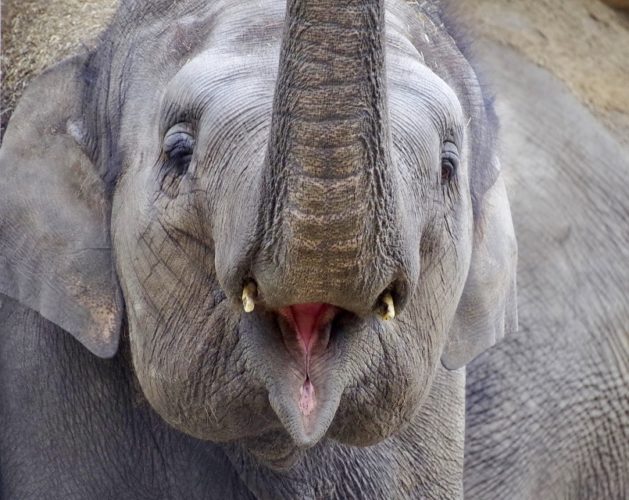During a visit to the St. Louis Zoo while on vacation a few years ago, I enjoyed the presentation of two animal shows. There are many that do not care for zoos nor animal shows for a variety of reasons, but a zoo is a good place for people to see the variety of God’s handiwork and see some species that are being bred in hopes of saving them from extinction. It is a delight to watch children’s eyes open wide as they see a tall giraffe, the bushy mane of a male lion, or the overwhelming size of an elephant, hippopotamus, or rhinoceros. It is wonderful to see animals in their created habitats, but visitors to zoos are provided the opportunity to see animals they would not be able to see otherwise. One of the performances in St. Louis involved elephants, and the other program displayed the talents of a cast of sea lions. It is amazing how animals can be trained to perform various tricks and acrobatic stunts. The elephant trainer had taught one of his pachyderms to dance a jig to music played through the arena’s sound system. The trainer of the sea lions presented various tricks to show the acute sense of balance God has given the cute creatures. One sea lion balanced a glass of water on the top of a pole about two feet tall which was set on the tip of his nose. The animal then attentively trotted up and down a staircase without spilling a drop of water. The sea lion was created with its own gyroscope to maintain stability of the precariously placed glass.
There is really not much practical value in training animals to entertain, but it illustrates for Christians the truth of Genesis 1:26, “let [man] have dominion over the fish of the sea, and over the fowl of the air, and over the cattle, and over all the earth, and over every creeping thing that creeps upon the earth.” Christians are to exercise dominion over the animal world and dominion includes training animals for pleasure and labor. Unfortunately, because of the history of kings and kingdoms throughout time the meaning of dominion is sometimes viewed negatively; it is seen as meaning oppressive rule or tyranny, but God’s concern is for a benevolent and empathetic care for creation whether it is beast, fish, or bird. God’s rule over his dominion is benevolent and gracious and his vicegerent image bearers are to rule likewise. This rule over our fellow creatures includes using the animal kingdom for labor, companionship, food, and even entertainment. Dominion must not be cruel or oppressive but instead exercised with the knowledge that animals are—as Francis Schaeffer expressed it, “our kin.” This kinship with the animals is not based on an evolutionary idea where we are kin because we are descended through evolution and natural selection, but it is a kinship based on having been made by God. God made the animals, but then Adam named them. Man is unique being made in the image of God and the caretaker of creation, but this does not mean that man does not have comradery with the fish of the sea, fowl of the air, and creatures that walk the earth. John Calvin, in the following quote, provides a nice summary of how God honored Adam and successive generations with care for and use of his creation.
Here God commemorates a part of the dignity which he decreed to honor man, namely, that he should have authority over all living creatures. He appointed man, it is true, lord of the world; but he expressly subjects the animals to him, because they, having an inclination or instinct of their own, appear less under authority from without. The use of the plural number intimates that this authority was not given to Adam only, but also to all his posterity as well as to him. And hence we infer the purpose for which all things were created; namely, that none of the conveniences and needs of life would be wanting to men. In the very order of the creation the paternal attentiveness of God for man is conspicuous, because he furnished the world with all things necessary, with an immense profusion of wealth before he formed man. Thus, man was rich before he was born.
Note the words “immense profusion of wealth before he formed man,” which refer not only to Eden but the creation as a whole as a palace or kingdom for Adam as he enjoyed fellowship with God. Calvin develops this idea more fully in his sermon on the verse.
Included in Scripture are various commands telling man how to treat the animal world. Deuteronomy 22:6,7, provides instruction concerning how to treat the mother bird and her young if one happens across them along one’s way. In 25:4, God provides instructions concerning care of beasts of burden saying, “You shall not muzzle the ox when he treads the corn.” As oxen walk across corn to separate the kernels from their cobs, they should not be inhibited from eating some of the corn themselves. Oxen were important animals in the era, and they continue to serve as four-legged multi-tools necessary for planting and harvesting crops. If a neighbor’s ox stumbled under its load it was the duty of passers by to help the drover redirect or rouse the animal to continue its work (22:4). Such assistance is not only a service to the neighbor but also an act of compassion and mercy towards the ox. God did not forget the animal kingdom when he provided his law. He saw that the animals and their created residence should be overseen with care and concern.
Animals have been trained for more utilitarian purposes than just enjoyment in zoos, but some of the abilities exhibited by zoo animals can be helpful for man’s work. Sometimes trainers are lifted high in the air as they stand on the elephant’s curved trunk, which is a skill that has been converted from entertainment to enterprise as elephants in Asia and Africa use their trunks to move logs or other heavy objects. Dogs are used for all kinds of work requiring their keen sense of smell. Canines sniff out illegal drugs in packages, contraband in cars, smuggled goods in luggage, and they have been taught to detect explosives, which is a skill greatly needed in the post 9/11 world. After catastrophes such as floods, volcanoes, and earthquakes, dogs can locate the living and dead in the rubble, ash, and muck of devastation. How often are the physically impaired assisted by a faithful friend? Monkeys have been trained in the past to alert the deaf about a ringing telephone, a knock at the door, or a crying baby. What about border collies racing to herd sheep, terriers tenaciously stalking and digging vermin, retrievers joyfully assisting hunters, and in India, peacocks’ shrill honks warn property owners of intruders. There are many other animals in God’s creation that have been adopted for their characteristics or trained to labor with man. Homing pigeons must not be forgotten in the digital communications age because their created sense of direction and location honed by selective breeding have been used for at least three-thousand years to deliver messages. The recent centennial of the First World War was a reminder of the importance of pigeons for communication within an army. Not only pigeons but other birds provide help by eating insects and killing vermin. Cats kill rodents. Bats are connoisseurs of insects. Earth worms aerate the soil. Not only are people and animals created, they were created to work and live together as colleagues inhabiting and caring for God’s world as he works through his providence.
Romans 8:22 tells us, “For we know that the whole creation groans and travails together in pain until now.” The Greek word translated travail was used to describe the pain and stress of a woman delivering a child. The universe is waiting to be liberated from the bondage of sin into the eschatological Eden of the new heavens and new earth. Animals are in bondage not because they have done evil but because of the fall and man’s sin. The first parents were given dominion over creation before the fall, but post fall, man’s rule over the creation was corrupted with thorns, thistles, and excessive toil. The only innocent victims of the fall are God’s creatures and their created home. Unfortunately, instead of considering the creation a colleague to care for, it is sometimes exploited for sinful gain and personal satisfaction. As Paul goes on to say in Romans 8, Christ and his redeeming work not only bring the grace of salvation from sin, but also deliverance of the creation from its groaning as Christians faithfully pursue caring for it as vicegerents. With so much significance given to the creation by the Bible, why is it that Christians are not more concerned about God’s world, his animals, and damage caused by pollution?
It is important for Christians to realize their responsibility to the animal kingdom and their earthly residence. Animals must not be abused, but neither are they to be worshipped. Creatures are to be treated with dignity because they show God’s glory. Animals have been given by God not only to labor for man and give companionship but also are to be used for food whether it is through products of the animal, such as eggs from a chicken, but also the animal itself. The dominion the Christian exercises should be one of compassion and mercy realizing the needs of the animal kingdom and the rest of creation.
Animals are a great blessing. They help to fight crime, guide the handicapped, and provide entertainment, but their abilities and skills that are currently discerned and applied leads to the question, what other skills of the creatures can be applied to care for the earth and assist individuals in their labor? Can the keen sight of birds of prey be helpful? Are there lessons to be learned about heat retention from the polar bear? Does the camel’s ability to survive extended periods without drinking water give any direction for problems of dehydration in people? It may be these few questions have already been considered and the author is showing his ignorance of science, but even if that is the case, there are a multitude of creatures each of which has unique aspects created in them by God. The Christian’s dominion over creation is a gift, privilege, and duty which must be exercised carefully and compassionately recognizing the importance of stewardship for God’s property.
Barry Waugh
Notes—I do not remember where Schaeffer talked about kinship with creation, but I imagine it is in Genesis in Space and Time. He probably used the term in other volumes of his several works as well. Banner of Truth is in the process of translating and publishing Calvin’s sermons on Genesis in a set. The quote from Calvin was found in his commentary as in English translation by The Calvin Translation Society, 1847; I have updated some of the archaic terms and a few phrases were reconstructed for clarity. The picture of the laughing elephant is from Pixabay.





